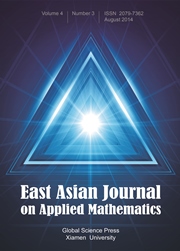Article contents
Integrable Properties of a Variant of the Discrete Hungry Toda Equations and Their Relationship to Eigenpairs of Band Matrices
Published online by Cambridge University Press: 31 January 2018
Abstract
The Toda equation and its variants are studied in the filed of integrable systems. One particularly generalized time discretisation of the Toda equation is known as the discrete hungry Toda (dhToda) equation, which has two main variants referred to as the dhTodaI equation and dhTodaII equation. The dhToda equations have both been shown to be applicable to the computation of eigenvalues of totally nonnegative (TN) matrices, which are matrices without negative minors. The dhTodaI equation has been investigated with respect to the properties of integrable systems, but the dhTodaII equation has not. Explicit solutions using determinants and matrix representations called Lax pairs are often considered as symbolic properties of discrete integrable systems. In this paper, we clarify the determinant solution and Lax pair of the dhTodaII equation by focusing on an infinite sequence. We show that the resulting determinant solution firmly covers the general solution to the dhTodaII equation, and provide an asymptotic analysis of the general solution as discrete-time variable goes to infinity.
MSC classification
Information
- Type
- Research Article
- Information
- Copyright
- Copyright © Global-Science Press 2017
References
- 5
- Cited by

